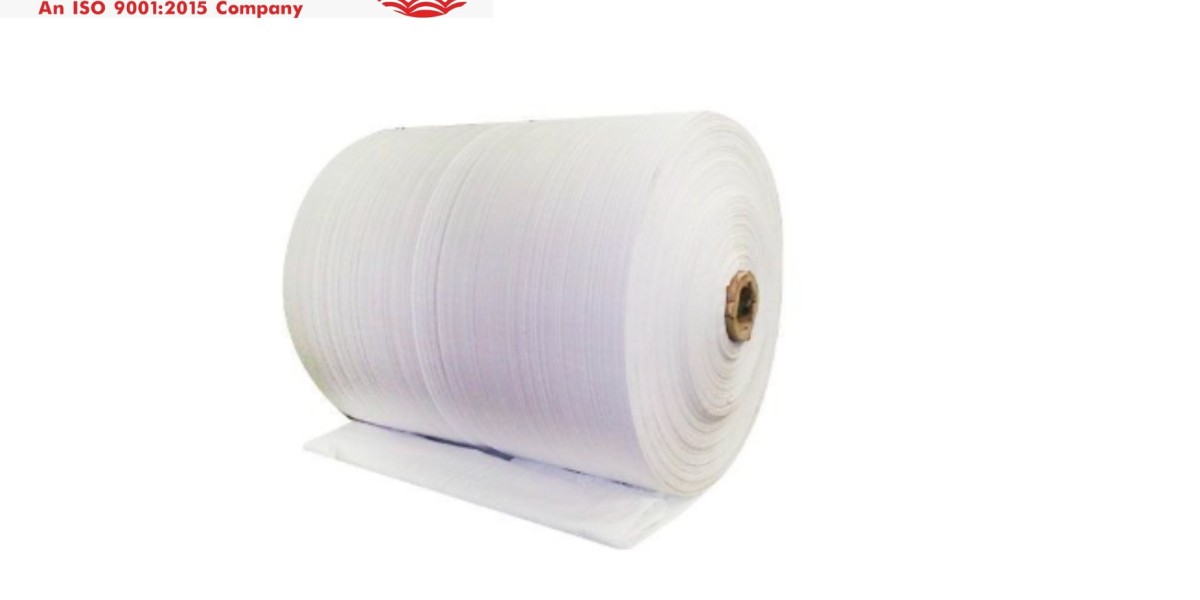Polypropylene (PP) woven fabrics have become an integral material for various industries around the world. Known for their strength, durability, and versatility, these fabrics are used in a wide range of applications including packaging, construction, agriculture, and more. PP woven fabric manufacturers in India are playing a crucial role in meeting the global demand for this essential material by offering high-quality, affordable, and customizable woven fabric solutions.
In this article, we will explore the manufacturing process, applications, and benefits of polypropylene woven fabrics, as well as the evolving landscape of PP woven fabric manufacturers in India.
What Are Polypropylene Woven Fabrics?
Polypropylene woven fabrics are made from polypropylene resin, a thermoplastic polymer known for its high tensile strength, resistance to wear and tear, and ability to withstand environmental conditions. The term "woven" refers to the way the fabric is produced — by interlacing polypropylene tapes in a crisscross pattern. This weaving process imparts significant strength to the material while keeping it lightweight and flexible.
These fabrics are available in various forms including laminated, non-laminated, and colored options, making them suitable for different uses in diverse industries.
The Manufacturing Process
The production of polypropylene woven fabrics involves several key steps:
Raw Material Preparation: The process begins with the preparation of polypropylene granules. These granules are melted and extruded into thin tapes that will later form the woven fabric.
Extrusion of Tapes: The molten polypropylene is forced through a narrow die to form long, flat tapes. These tapes are then cooled and stretched to enhance their tensile strength. The stretching process helps improve the durability and flexibility of the material.
Weaving: The stretched polypropylene tapes are woven together using specialized looms. This weaving process involves interlacing the tapes in a pattern that enhances the fabric's strength and stability. The weaving can be customized to meet the specific requirements of different industries.
Lamination (Optional): Depending on the intended application, some PP woven fabrics are laminated with an additional layer of material. This lamination adds waterproofing and further strengthens the fabric, making it suitable for packaging moisture-sensitive goods.
Cutting and Customization: Once the woven fabric is ready, it is cut into the desired size and shape. PP woven fabric manufacturers in India often offer additional services like printing, cutting, and stitching to meet the specific needs of their customers.
Applications of Polypropylene Woven Fabrics
The adaptability of polypropylene woven fabrics has made them indispensable across a variety of industries. Some of the most common applications include:
Packaging: One of the most significant uses of PP woven fabrics is in the packaging industry. These fabrics are used to create woven bags, sacks, and bulk containers for products like rice, flour, sugar, animal feed, and fertilizers. Their strength and moisture resistance make them ideal for bulk packaging and long-term storage.
Agriculture: In agriculture, PP woven fabric is used for packaging and storing agricultural products such as seeds, crops, and fertilizers. Additionally, they are used to create shade nets, ground covers, and weed control fabrics.
Construction: PP woven fabrics are frequently used in the construction sector as geotextiles, tarpaulins, and protective covers. These fabrics provide excellent support in soil stabilization, erosion control, and as temporary construction covers.
Transportation: In transportation and logistics, PP woven fabrics are used to manufacture flexible intermediate bulk containers (FIBCs) or bulk bags that are capable of carrying heavy loads like cement, chemicals, and industrial products.
Retail and E-commerce: With customization options like printing, branding, and color choices, PP woven fabric manufacturers cater to the retail sector by providing eco-friendly and reusable shopping bags and packaging materials for various e-commerce products.
Advantages of Polypropylene Woven Fabrics
There are several reasons why PP woven fabric manufacturer in India are seeing increased demand for their products. Some of the major benefits of polypropylene woven fabrics include:
High Strength-to-Weight Ratio: PP woven fabrics are extremely strong despite their lightweight nature. This makes them ideal for packaging heavy or bulky products without adding significant extra weight.
Durability: These fabrics are resistant to wear, tear, and puncture. Their durability ensures that they can withstand rough handling and transportation over long distances.
Moisture Resistance: Polypropylene is naturally resistant to water, making PP woven fabrics suitable for packaging and storing products that need to be protected from moisture or damp environments.
Cost-Effective: The production process for polypropylene woven fabrics is relatively low-cost, especially when produced in large quantities. This affordability makes them an attractive option for industries looking for economical packaging solutions.
Customizable: PP woven fabric manufacturers can customize their products to meet the specific needs of their clients. From size, thickness, and color to branding and lamination, the customization options are endless.
Recyclable: Polypropylene is a recyclable material, which means that PP woven fabrics can be reused or recycled at the end of their life cycle, contributing to environmental sustainability.
The Role of Indian Manufacturers
India is a leading player in the global market for PP woven fabrics. PP woven fabric manufacturers in India are renowned for producing high-quality fabrics at competitive prices. Indian manufacturers also have access to advanced technology and machinery, enabling them to meet large-scale demand while maintaining superior quality standards.
Indian manufacturers cater not only to the domestic market but also export their products to countries across the globe. Their ability to offer cost-effective solutions combined with stringent quality control has made India a major hub for polypropylene woven fabrics.
Conclusion
PP woven fabric manufacturers in India are essential to industries around the world, providing versatile, durable, and cost-effective fabric solutions. From packaging and agriculture to construction and transportation, polypropylene woven fabrics are used in a wide range of applications. With increasing global demand, Indian manufacturers are continuously innovating and expanding their offerings, solidifying their position in the international market.
As sustainability becomes a growing concern, the ability of PP woven fabrics to be reused and recycled is an important advantage. Whether it's for packaging bulk goods or providing support in construction projects, polypropylene woven fabrics are a material that delivers value in every sense.
Here Are Three Related For pp woven fabric manufacturers in india
1. What is the price range of polypropylene woven fabrics?
Ans: The price for polypropylene woven fabrics can vary based on factors like thickness, size, and customization. On average, prices range from $0.15 to $0.50 per square meter depending on the specifications.
2. Can PP woven fabrics be customized with logos or branding?
Ans: Yes, PP woven fabric manufacturers offer customization options including printing logos, designs, or product information on the fabrics. This makes them a great option for branded packaging.
3. Are PP woven fabrics eco-friendly?
Ans: PP woven fabrics are considered eco-friendly due to their recyclability and reusability. Many manufacturers are adopting sustainable production methods, making them a greener choice for various industries.










